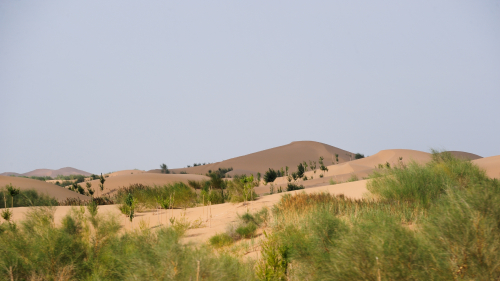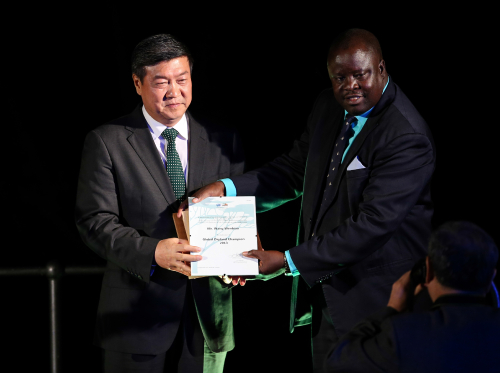|
 |
|
Desert willows planted by local farmers have effectively stopped sand movement in Hobq Desert (XINHUA) |
In 2000, throughout March and April, Beijing was engulfed in one of the worst spell of sandstorms in history. It was at that time that many Chinese people became acutely aware of the threat of worsening land degradation in the country's north. Fifteen years later, however, the situation has dramatically improved. In this process, a substantial number of strategies to tackle desertification have been implemented in China, some of which began as far back as 1977 when the First UN Conference on Desertification was held in Nairobi, Kenya.
In his opening address at the Fifth Kubuqi International Desert Forum held in north China's Inner Mongolia Autonomous Region on July 28-29, Zhang Jianlong, head of China's State Forestry Administration, said, "As one of the countries in the world most severely hit by desertification, China incurred an annual direct economic loss of more than 54 billion yuan ($8.7 billion), with more than 400 million of its people being affected."
Deserts cover almost 20 percent of China's territory, and the areas threatened by desertification amount to over 25 percent of the country's total landmass. The State Council, China's cabinet, has announced a plan starting that by 2020, over half of the country's land affected by desertification, totaling 10 million hectares, would be rehabilitated.
Human activities, such as overgrazing, overplanting and deforestation, combined with natural processes, are the main causes of desertification and land degradation. Some of China's countermeasures have had impressive results and Hobq Desert in Inner Mongolia appears to be a highly regarded reference at home and abroad.
Hobq experiment
Wang Wenbiao, the 56-year-old President of the private Elion Resources Group in Inner Mongolia, has always had a skin-deep awareness of the curse of desertification in Hobq Desert, a large swathe of dry land in the northern edge of the Ordos Plateau. "I come from a family of farmers—my parents, my grandparents were farmers," he explained. "I always tell people that where there is desert, there's poverty, and when there is poverty, there is desert."
As a young salt factory manager in the 1980s, Wang saw the benefits of new local and national policies, mainly the reform of the property rights, enabling a synergy between rural households and businesses to prevent and control desertification. In 1988, Wang took the helm of Elion Resources, which specializes in a desert-based green economy involving medicinal plants, renewable energy, soil improvement and ecological restoration.
Under Wang's leadership, Elion Resources has carried out a series of anti-desertification projects. Due to its efforts, in Hobq Desert area alone, the livelihoods of more than 100,000 farmers and herdsmen have been transformed and improved, and 11,000 square km of degraded land have been turned into productive land. The company has obtained international recognition and won the Environment and Development Award from the UN Environment Programme in 2012 for its achievements. The UN Convention to Combat Desertification (UNCCD) has proposed a target of "zero growth of desert farmland around the world by 2030" on the basis of the development model of Hobq Desert.
Local farmer Zhang Xiwang, 44, has been planting a drought-resistant and economically efficient indigenous species of desert willow in Hobq Desert for more than 10 years. "We are trying to control the expansion of sand. Our team can plant up over 66.7 hectares every year. Elion Resources has a lot of teams involved in this project," Zhang told reporters at this year's Kubuqi Forum.
Such teams can earn up to 200,000 yuan ($32,220) annually, enough to provide each team member with a median annual income of 5,000 yuan ($805.5). Besides desertification control and afforestation, Elion Resources has also diversified its activities in Hobq Desert and developed not only a vibrant herbal medicine sector (mainly licorice, ginseng and cistanche), but also biomass together with solar and wind energy.
At a press conference during the Kubuqi Forum in July, John Kufuor, former President of Ghana (2001-09), extolled the benefits of the Hobq model. "It's really amazing. I travel around the world and I see deserts. But coming to Hobq is enlightening because the achievement of greening the desert the way it is done here is something I believe should be emulated," he said.
Elion Resources has also established the Green Silk Road Fund dedicated to projects related to the Silk Road Economic Belt and the 21st-Century Maritime Silk Road that were proposed by Chinese President Xi Jinping in 2013. Xi's initiative aims to enhance infrastructure connectivity and promote trade and investment among countries along the routes of the proposed Belt and Road.
The Belt and Road Initiative promotes a concept combining ecology and civilization to develop what has been coined a green Silk Road. Besides public investment, private businesses' participation is essential.
"A combination of government support, individual land lease and private business initiative has made the desert greener, companies stronger and farmers richer," Wang said at the Kubuqi Forum, stressing that his company has been involved in public-private partnership arrangements for more than 20 years.
 |
|
Wang Wenbiao receives the first Global Dryland Champion award from Luc Gnacadja, Executive Secretary General of the UN Convention to Combat Desertification, in Windhoek, Namibia, on September 23, 2013 (XINHUA) |
A global concern
In her address at the Kubuqi Forum, Monique Barbut, Executive Secretary of UNCCD, raised the question of replicating the Hobq model on a local scale.
"We need vision certainly, we need flagship projects that inspire and engage. We need an intelligent policy framework and partnerships especially with affected communities. The right support and incentives can help turn degraded land into a productive asset," Barbut said.
Experts and academics alike at the Kubuqi Forum were keen to point out in panel talks that there are specific answers to desertification and land degradation at a local level and that a more coordinated approach should be implemented to tackle the problem.
According to Mohamed Moussa, a researcher at the Arid Regions Institute in Tunisia, in numerous arid regions worldwide, rural practices inherited from previous generations are harmful and largely unproductive. "Desertification and mass rural migration go hand in hand," Moussa remarked. "There's a cumulative effect. If people don't work the land, erosion sets in and the gullying process intensifies. People are then forced to leave".
Kristina Toderich, a plant scientist at the International Centre for Biosaline Agriculture in Tashkent, Uzbekistan, insisted on a hands-on approach to helping farmers in desert areas. She argued that International organizations cannot be a panacea as problems arise, not only from resistance to change, but also from a lack a follow-up on agricultural projects.
"This is why the private sector is so important," Toderich said, adding that "businesses speak a language that farmers understand."
For David Gallagher, an assistant professor at Zayed University in Dubai, the United Arab Emirates, the collaboration between farmers and private enterprises is not an issue per se. "It's more about asking big companies to put major investment in with government support and guarantees," he said. Gallagher called for transparency, a better allocation of scarce resources such as land and water, as well as a more coordinated approach amongst all the stakeholders, including government departments at all levels.
Rainfall amounts affect the approach to fight against desertification.
"In Hobq Desert, they divert water from the Yellow River, and they irrigate sand dunes. In Tunisia, it's a luxury we cannot afford," Moussa explained. "I work in areas where the average annual rainfall is less than 200 mm, two to three times less than in Hobq. In these arid areas, we have introduced terracing to decrease erosion and surface runoff and maximize the use of rainwater".
Maximilian Abouleish-Boes is chief sustainable development officer at SEKEM, an all-encompassing project in the suburbs of Cairo, Egypt, integrating ecology with social, economic and cultural development. SEKEM and Elion Resources shared the 2015 Land for Life Award, a UNCCD trophy rewarding successful initiatives in combatting desertification, land degradation and drought.
Abouleish-Boes said, "There are specificities, for example rainfall—that's why you cannot have a SEKEM model in Hobq and an Elion model in Egypt...The elements are comparable but the interesting thing is that the dynamics of development [in Hobq] is much more large-scale but both sides can show the world something."
According to Abouleish-Boes, the clock is ticking, and studies show that the rate of desertification in China appears to be exceeding the rate of environmental restoration. "Hobq has undoubtedly blazed a new trail and has given a fresh impetus to a more sustainable approach that should be emulated in similar ecosystems in China and along the Silk Road," he added. "It's already in the right direction, and we have to respect that somehow."
The author is a French journalist living in Beijing
Copyedited by Kylee McIntyre
| 